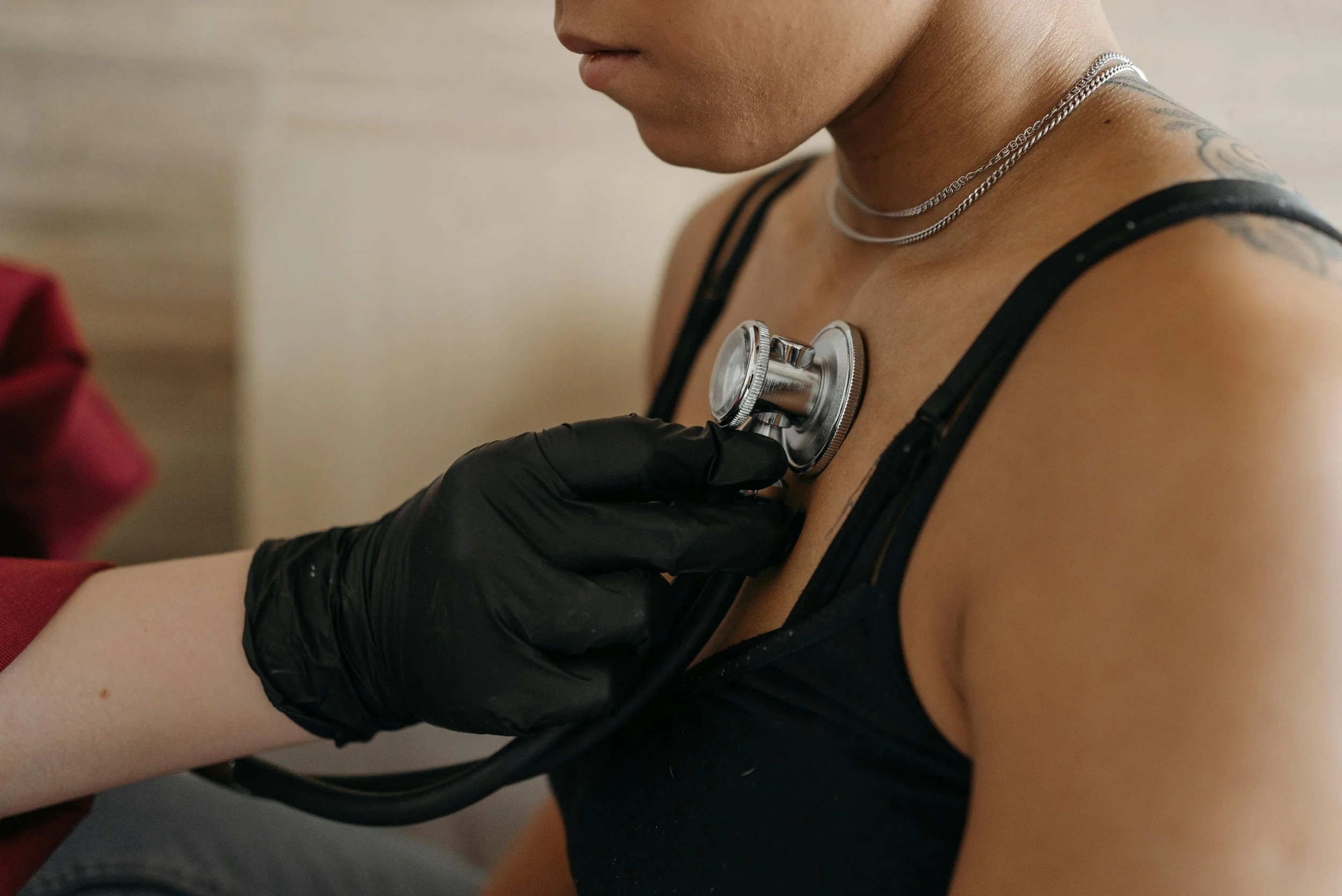Essential Health Screenings at Every Age: Your Guide to Staying Healthy
Regular health screenings can help detect potential issues before they become serious. (PHOTO: Pavel Danilyuk/Pexels)
By Dr Laylah Fayker | MBChB (STELL)
The proverb, “Prevention is better than cure,” carries much weight regarding your well-being. Many people think seeing a doctor is only necessary when you’re sick, but regular check-ups and screening tests are key to staying healthy. Prioritising preventive care is about wellness as much as illness.
Regular screenings help detect potential health issues early, making them easier to treat. As we age, our bodies require different tests at different stages of life.
We’ve compiled a list of essential screening tests by age to help you take charge of your health. Early detection ensures timely intervention and better outcomes.
Early childhood health checks lay the foundation for lifelong wellness. (PHOTO: Marctutorials/Pexels)
CHILDHOOD (Birth – 12)
In early childhood, it’s essential to monitor your child’s growth, development, and overall health.
1. Newborn Screening: After birth, babies are screened at the hospital for genetic, endocrine, and metabolic disorders, along with hearing loss. Doctors also check for physical abnormalities and monitor for signs such as poor feeding or sleep difficulties that may indicate underlying issues.
2. Growth and Development Checks: Growth charts are used to track whether your baby is growing at a healthy rate for both weight and height. These checks are typically done with a paediatrician or at a clinic during regular check-ups after birth. This screening is crucial because if a child’s growth rate or weight is lower than expected, it can lead to low energy, poor feeding, and a weakened immune system, making them more susceptible to illness.
3. Immunisations: During the first 12 years of your child’s life, they should receive a series of vaccines as part of South Africa’s Expanded Programme of Immunisation. Most vaccines are given before the age of one to prevent illness and reduce childhood mortality. These vaccinations can be administered by a paediatrician or at your local clinic.
4. Vision and Hearing Tests:
Early vision and hearing screenings are crucial for your child’s development, as these senses impact their ability to interact with the world around them.
Vision: It’s essential to check your child’s vision within the first 12 years to detect and address issues early, preventing long-term problems. Vision tests are conducted at birth, 6 weeks, and 6 months, with regular checks during follow-up visits.
Hearing: Hearing is key to speech, language development, learning, and social interaction. Early detection of hearing issues ensures timely intervention and prevents delays that could affect your child’s quality of life. Hearing is tested during the first month and at follow-up visits. If abnormalities are found, an audiologist or ENT specialist will determine the necessary hearing device.
5. Dental Checkups: Maintaining good oral health prevents serious dental issues. While children may not enjoy dentist visits, it’s important to positively reinforce dental care at home. We only get two sets of teeth, so they must be taken care of.
By your child’s first birthday, dental checkups should begin once the first tooth appears. After that, checkups should occur every 6 to 12 months.
Regular health check-ups in adolescence support physical, emotional, and mental well-being during this crucial growth phase. (PHOTO: Cottonbro/Pexels)
ADOLESCENCE (13 – 18)
As children become teenagers, healthcare focuses on physical and emotional development. This period shapes their understanding of the world and sense of identity.
1. Annual Wellness Visits: Annual check-ups are important for monitoring growth, ENT issues (like sinusitis, tonsillitis, and allergies), and mental health. If needed, a psychologist or psychiatrist referral will be made. Adolescence brings exposure to mental health risks like eating disorders and mood issues. Early detection is key to treatment.
2. Immunisations: In this age group your child should get the:
HPV vaccine
Meningococcal vaccine
Booster shots
3. Vision and Hearing Tests: Screenings for this continue throughout your child’s teenage years. These tests should be done as needed.
4. Sexual Health: In adolescence, as children learn about sex education, they may become sexually active at a younger age. At this stage, screening for STIs and HIV is important.
Prioritise your health in young adulthood with regular screenings and healthy habits for long-term well-being. (PHOTO: Koolshooters/Pexels)
YOUNG ADULTS (19 – 39)
1. Annual Physical Exam: An annual exam ensures overall health, including checks for glucose, cholesterol, haemoglobin, BMI, and mental health.
2. Pap Smears: Starting at age 21, women should get Pap smears and HPV testing to screen for cervical cancer and pelvic conditions.
3. STI Screening: Get tested for STIs based on lifestyle and risk factors. Our practice offers a comprehensive screening, including tests for HIV, syphilis, and gonorrhea.
4. Skin Assessments: Regular check-ups for moles, rashes, or lesions are essential, as they can change rapidly and may require biopsies.
5. Immunisations: Stay up to date with booster vaccinations and the annual flu vaccine.
Stay ahead of potential health risks with essential screenings and proactive care in middle age. (PHOTO: Jopwell/Pexels)
MIDDLE AGED (40 – 64)
1. Mammograms/Breast Cancer Screening: Mammograms are specialized x-rays of breast tissue that help detect breast cancer markers. Women should start annual screenings at age 40, or earlier if risk factors are present.
2. Colon Cancer Screening: Starting at age 45, colon cancer screenings are done through stool tests or a colonoscopy. This should also be done if you experience constipation, diarrhoea, or mild abdominal discomfort.
3. Blood Pressure and Cholesterol Checks: As you age, regular checks for high blood pressure and cholesterol are crucial for heart health. These should be done annually or every 6 months.
4. Diabetes Screening: Starting at age 45, annual diabetes screenings are recommended, or earlier if risk factors are present. Diabetes affects all organs, making early detection vital.
5. Eye Exams: Visual clarity declines with age. Eye exams every 2 to 4 years help detect issues like glaucoma and cataracts.
6. Bone Density Test: Women undergoing menopause should get bone density scans to assess risk for fragility fractures due to decreased estrogen levels and bone loss.
7. Prostate Cancer Screening: Men should start prostate cancer screenings at 50, or earlier depending on risk factors. A blood test helps detect issues and is done every 10 years.
Prioritise your well-being and maintain quality of life with regular checkups and preventive care in older age. (PHOTO: Vlada Karpovich/Pexels)
OLDER ADULTS (65+)
Healthcare in older age focuses on maintaining quality of life and managing chronic conditions.
1. Bone Density Test: With age, bones become more fragile, increasing the risk of osteoporosis and fractures. Bone density tests and x-rays for joints help identify at-risk areas and allow for preventative interventions. These tests are typically done in a radiology suite at a hospital.
2. Hearing and Vision Checks: Annual or as-needed checks for hearing and vision are important for maintaining function and quality of life.
3. Vaccinations: As immunity declines with age, booster vaccines are recommended. Common ones include the shingles, flu, and pneumonia vaccines, as older adults are more susceptible to serious illness.
4. Cognitive Screening: Regular cognitive tests, like the Mini-Mental State Examination or MoCA (Montreal Cognitive Assessment), help detect early signs of dementia or Alzheimer’s disease.
5. Cancer Screenings: Continue recommended mammograms, colonoscopies, and prostate exams from earlier years.
6. Fall Risk Assessment: A Fall Risk Assessment evaluates past falls and potential risk factors (e.g., mobility, vision), and helps create an action plan to minimize future falls.
7. Cardiovascular Screening: Monitor heart health through cholesterol checks, blood pressure, and an ECG if symptoms like chest pain are present.
Preventive healthcare measures are a lifelong commitment and screenings tailored to each stage of your life can help detect and prevent serious health issues. Contact us today to help create a personalised screening schedule that meets your needs. Staying proactive about health today ensures a healthier tomorrow.






